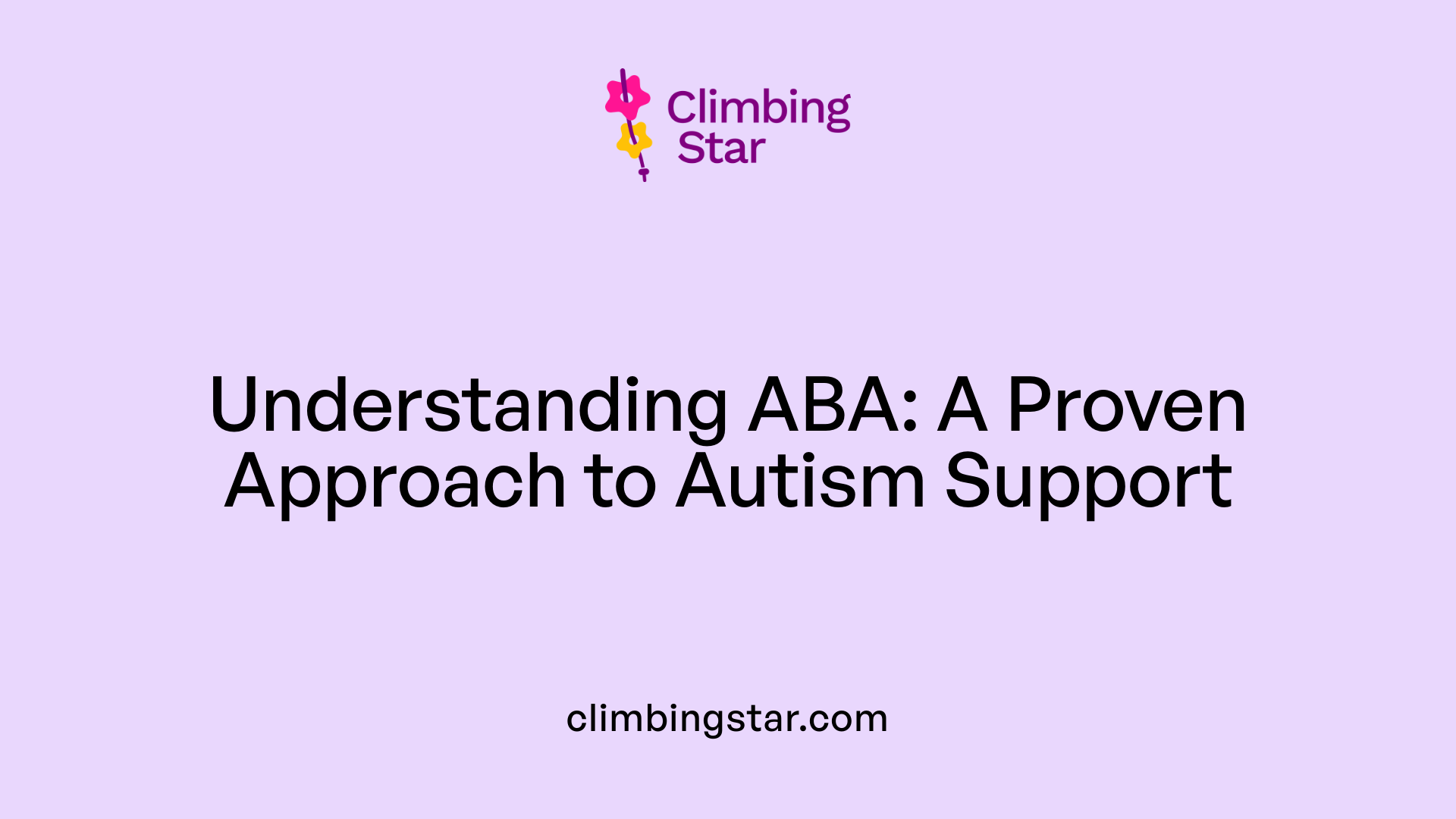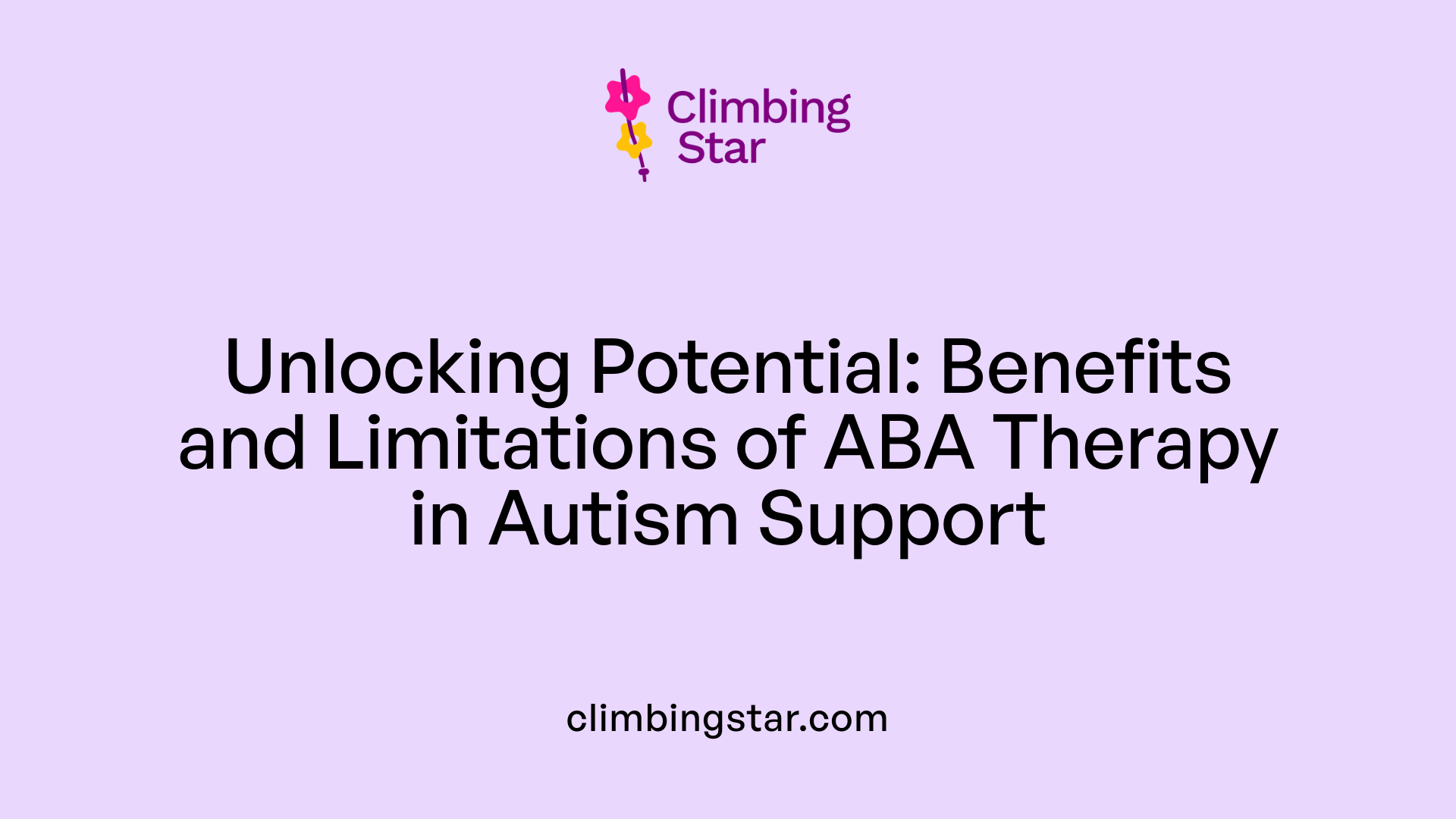Introduction to BCBA Careers and Compensation
Board Certified Behavior Analysts (BCBAs) play a vital role in supporting individuals with autism through Applied Behavior Analysis (ABA) therapy. With the demand for BCBAs rapidly increasing, understanding the details of BCBA salaries, including factors that influence pay and geographic variations, is essential for professionals considering this rewarding career path or those interested in the field's economic landscape.
What is Applied Behavior Analysis (ABA) Therapy and Its Role in Autism Support?

Definition and principles of ABA therapy
Applied Behavior Analysis (ABA) therapy is a science-based approach that applies learning principles to influence meaningful behavior change. Centered on the understanding of behavior in context, ABA uses systematic techniques to increase positive skills and reduce undesired behaviors.
Use of ABA to support individuals with autism
ABA therapy is widely recognized for its effectiveness in supporting individuals diagnosed with autism spectrum disorder (ASD). It helps improve crucial skills such as communication, social interaction, and daily living activities by tailoring programs to each person's unique needs.
Techniques like positive reinforcement and behavior chaining
Key methods in ABA include positive reinforcement, which encourages desirable behaviors by offering rewards, and behavior chaining, which breaks complex tasks into smaller steps to teach sequences of behavior. Additional practices involve prompting and data-driven decision making within the ABC (Antecedent-Behavior-Consequence) framework.
Settings where ABA therapy is delivered
ABA services are delivered across multiple environments, including homes, schools, clinics, and community settings, allowing skill generalization and real-world applicability.
Evidence supporting ABA as an effective treatment
Research has consistently demonstrated that ABA is an evidence-based best practice for enhancing developmental and behavioral outcomes in children and adults with autism, providing measurable improvements in quality of life and functional abilities.
Who Provides ABA Therapy and Their Qualifications

Roles of BCBAs, BCaBAs, and RBTs
ABA therapy is primarily delivered by a team of behavior analysis professionals: Board Certified Behavior Analysts (BCBAs), Board Certified Assistant Behavior Analysts (BCaBAs), and Registered Behavior Technicians (RBTs). BCBAs, at the master's or doctoral level, design and oversee treatment plans. BCaBAs assist BCBAs and work under their supervision. RBTs provide direct therapy services and implement behavioral interventions under BCBA or BCaBA supervision.
Educational and Certification Requirements for BCBAs
BCBAs must complete graduate-level coursework in behavior analysis or related fields, backed by a strong foundation in psychology or education. Certification requires meeting academic standards, completing supervised practice hours, and passing a rigorous certification exam.
Examination and Cost Details for Certification
To become certified, BCBAs must pass an exam containing 160 questions. The total cost usually includes a $245 application fee plus an exam fee. For BCaBAs, their exam has 140 questions, with fees totaling around $175 plus an exam fee. These exams ensure competency in behavior analytic concepts and ethics.
Supervised Practice Hours
Candidates must complete supervised fieldwork, typically between 1,500 and 2,000 hours. This supervised experience is critical, ensuring practical training under qualified professionals before independent practice.
Continuing Education and Ethics Standards
After certification, all providers must maintain their credentials through continuing education and adhere to strict ethical standards established by the Behavior Analyst Certification Board (BACB). This commitment ensures therapists stay current with techniques and maintain professional responsibilities.
Who typically provides ABA therapy and what qualifications do these professionals have?
ABA therapy is offered by BCBAs, BCaBAs, and RBTs. BCBAs hold master's or doctoral degrees, complete supervised practice, and pass a 160-question exam costing roughly $245 plus fees. BCaBAs have undergraduate education with specific coursework, supervised experience, and pass a 140-question exam costing about $175 plus fees. RBTs complete a 40-hour training course, pass a competency exam, and deliver therapy under supervision. All are certified by the BACB and maintain their qualifications through continuing education and ethics adherence.
Average BCBA Salaries: National and Regional Variations

What Are the Average National Salaries for BCBAs in 2023?
As of 2023, the average base salary for board-certified behavior analysts (BCBAs) in the United States hovers around $85,571 annually, according to ZipRecruiter. Other data sources highlight a typical salary range between $70,000 and $89,500, with entry-level salaries starting from $50,000 to $60,000. Salaries generally increase with experience and advanced degrees, with doctoral-level BCBAs earning up to $120,000.
What Are the Salary Ranges and Percentiles?
- 25th percentile: Approximately $70,000
- 75th percentile: Around $89,500
- 90th percentile: Up to $120,000
This spread indicates that while many BCBAs earn near the mid-range, top earners with more experience or advanced qualifications command higher salaries.
How Do Salaries Compare Across Top-Paying States and Metropolitan Areas?
Several states lead the pack with above-average salaries for BCBAs, including:
| State | Average Salary | Notes |
|---|---|---|
| New Jersey | $95,532 | Among the highest in the nation |
| Wisconsin | $94,521 | Strong demand region |
| Nevada | $91,642 | Competitive salaries in the western US |
| Massachusetts | $91,114 | High median salary with strong job growth |
| Minnesota | $90,644 | Popular region with good funding |
In metropolitan areas, salaries can exceed state averages, especially in California, Massachusetts, and Washington:
| Metro Area | Average Salary |
|---|---|
| Santa Cruz, CA | $108,424 |
| Sunnyvale, CA | $105,572 |
| Los Angeles, CA | $101,449 |
| Barnstable Town, MA | $102,961 |
| Kent, WA | $101,708 |
How Does Geographic Location Influence BCBA Pay?
Location greatly influences BCBA salaries due to varying demand, cost of living, and funding. The West and Northeast regions typically offer higher pay, reflecting strong autism service markets and funding support. For example, California, Massachusetts, New York, and New Jersey feature prominently among high-paying states and thriving BCBA job markets. Rural or less populated areas usually offer lower salaries.
Overall, geographic factors alongside experience, education, and workplace setting combine to drive salary variations for behavior analysts across the country.
Factors Influencing BCBA Salaries: Education, Experience, and Work Setting

How Does Education Level Affect BCBA Salaries?
Education plays a significant role in salary variation among Board Certified Behavior Analysts (BCBAs). Bachelor's level BCBAs typically earn between $70,000 and $90,000 annually. Those with doctoral degrees can expect higher earnings, generally ranging from $90,000 to $120,000. This trend highlights the value of advanced education in reaching upper salary brackets within the field.
What Is the Impact of Experience on BCBA Earnings?
Experience also influences salary considerably. Entry-level BCBAs often start with salaries in the $50,000 to $60,000 range. Analysts with 1 to 4 years of experience typically earn around $63,000, while those with over 20 years of experience can make about $80,000 annually. This progression reflects the growing expertise and responsibility that comes with years on the job.
How Do Work Settings Affect BCBA Pay?
The work environment further impacts BCBA salaries. Private practice settings tend to offer the highest pay, with salaries ranging from $80,000 to $120,000. Healthcare roles usually pay between $70,000 and $100,000, while positions within non-profit or government organizations generally fall between $60,000 and $80,000. This variation is often due to differences in funding, organizational priorities, and resources.
What Is the Salary Progression From RBT to BCaBA to BCBA?
Career progression in behavior analysis is often marked by certification level and corresponding salary increases. Registered Behavior Technicians (RBTs) earn approximately $36,763 per year. Those advancing to Board Certified Assistant Behavior Analysts (BCaBAs) see salaries increase to an average of $54,274. Upon achieving BCBA certification, salaries rise noticeably, averaging $69,788, with further potential growth as expertise and experience deepen.
Below is a summarized table outlining typical BCBA salary differences based on education, experience, and work setting:
| Certification Level | Typical Salary Range | Notes on Educational Influence |
|---|---|---|
| RBT | $36,763 | Entry-level clinical technician role |
| BCaBA | $54,274 | Associate-level certification |
| BCBA | $69,788 (avg) to $120,000+ | Bachelor's to doctoral degrees impact pay |
| Experience | Salary Influence | Description |
|---|---|---|
| 1-4 years | ~$63,000 | Early career phase |
| 20+ years | ~$80,000 | Senior-level experience |
| Work Setting | Salary Range | Description |
|---|---|---|
| Private Practice | $80,000 to $120,000 | Often highest pay due to direct client services |
| Healthcare | $70,000 to $100,000 | Hospitals, clinics |
| Non-profit/Govt | $60,000 to $80,000 | Typically more constrained budgets |
Understanding these factors can help current and prospective BCBAs make informed decisions about education, career path, and employment settings to maximize their earning potential.
The Growing Demand for BCBAs and Its Impact on Salaries
Employment Growth Statistics and Projections
The job market for Board Certified Behavior Analysts (BCBAs) has experienced rapid expansion, with a 23% increase in employment demand from 2021 to 2022. This growth is projected to continue, with a career growth rate estimated at 20-22% over the next decade. The notable rise in job openings reflects the increasing need for behavioral health services across the United States.
States and Regions with Highest Job Postings
Demand is especially high in states such as California, Massachusetts, Texas, Florida, and New Jersey. California alone accounted for over 13,000 BCBA job postings in 2022. Furthermore, metropolitan areas like Santa Cruz and Sunnyvale in California, Barnstable Town in Massachusetts, and Kent in Washington offer some of the highest average salaries for BCBA professionals.
Relations Between Demand, Job Growth, and Salary Increases
The surge in BCBA demand correlates directly with salary growth. As demand escalates, average salaries have correspondingly risen, with many regions offering salaries well above the national average. For example, entry-level positions begin around $50,000 to $60,000, while experienced BCBAs in high-demand locations may earn upwards of $100,000 annually. Leadership roles in behavioral health can further push salaries to $112,000 or more.
Growth Driven by Rising Autism Diagnosis Rates
A primary catalyst for this employment expansion lies in the increasing rates of autism diagnoses, with approximately 1 in 36 children diagnosed with Autism Spectrum Disorder (ASD) as of 2020. This has spurred greater demand for BCBA services in schools, clinics, and public health settings, pushing the field of applied behavior analysis into significant growth territory.
The combined effect of rising autism diagnoses and expanding therapeutic services is transforming the BCBA profession into one with growing opportunities and rewarding compensation.
Leadership and Specialized Roles Within the BCBA Profession
Higher salary roles such as behavioral health directors and clinical directors
Behavior Analysts who advance into leadership and specialized positions often experience a significant increase in salary. Roles like behavioral health directors and clinical behavioral directors typically command higher pay than entry-level or standard BCBA positions. Behavioral health directors can earn around $112,000 annually, reflecting the added responsibilities and oversight required in such roles. Similarly, clinical behavioral directors earn approximately $85,000 to $90,000, depending on the organization and location.
Salary ranges for leadership positions
Leadership roles in the BCBA field exhibit a wider salary range, generally exceeding $100,000 for top earners. For example, behavior analyst directors may earn about $100,000 annually, whereas clinical directors often earn slightly less but still above average BCBA salaries. These leadership salaries often reflect years of experience, geographic location, the size of the employing organization, and the scope of leadership duties.
Advancement through specialization, education, and management roles
Professional advancement in the BCBA career pathway is closely tied to further specialization, higher education, and assuming management roles. BCBAs with advanced degrees or certifications, or those who specialize in areas such as autism treatment, supervisory duties, or organizational administration, typically see improved earning potential. Progressing to management or administrative positions enables BCBAs to command salaries well above the standard range, often facilitating financial and career growth while influencing broader organizational and treatment outcomes.
Insurance Reimbursement and Legislative Support for BCBA Services
What Legislation Supports Insurance Reimbursement for ABA Therapy?
Several states have enacted laws mandating insurance coverage for Applied Behavior Analysis (ABA) therapy, which is a core service provided by Board Certified Behavior Analysts (BCBAs). These laws require insurers to cover ABA treatment for autism spectrum disorder (ASD), recognizing the clinical importance of this intervention.
How Does the New York Mandate Impact ABA Therapy Coverage?
New York passed legislation in 2013, enacted in 2014, that mandates insurance reimbursement for ABA therapy as an authorized treatment for autism. This law specifically recognizes BCBAs as eligible providers for insurance reimbursement. Significantly, there is no age limit for autism treatment coverage under this mandate. However, coverage is capped at $45,000 per year for each child receiving ABA services.
Who Is Eligible for Insurance Coverage and What Are the Reimbursement Limits?
Under laws like New York's, BCBAs are considered eligible professionals, which enhances access to ABA services for individuals diagnosed with ASD. The reimbursement caps, such as the $45,000 annual limit per child, are designed to balance comprehensive treatment access with insurance cost management.
How Do Insurance Policies Affect BCBA Employment and Roles?
Insurance mandates to cover ABA have broadened employment opportunities for BCBAs considerably. Increased reimbursement leads to expanded demand in clinics, schools, and healthcare facilities, thereby supporting higher job postings particularly in states like New York, California, Massachusetts, and New Jersey. These policies encourage agencies and healthcare providers to hire more BCBAs and to provide extensive ABA services covered by insurance, thus strengthening the profession's role in autism treatment nationwide.
Benefits and Limitations of ABA Therapy for Individuals with Autism

What are the benefits and limitations of ABA therapy for individuals with autism?
Applied Behavior Analysis (ABA) therapy offers significant benefits for individuals with autism, primarily through improving communication, language, and cognitive skills. Over the past 40 years, extensive research has supported ABA's effectiveness in reducing problematic behaviors, making daily living easier and more enjoyable. Its flexibility allows treatment to be personalized, adapting methods to suit each person's unique strengths and challenges.
ABA therapy emphasizes positive reinforcement and promotes a person-centered approach, tailoring interventions to the individual's goals. While the therapy is most commonly studied and applied in children under 10, its techniques can be beneficial throughout an individual's lifetime, assisting with skill development and enhancing quality of life.
However, ABA therapy comes with limitations. It requires a significant time commitment, often needing many hours per week to achieve meaningful progress. Additionally, effectiveness can vary between individuals; not all respond to the therapy in the same way. Ethical considerations have been raised regarding ABA's respect for neurodivergence. Modern ABA practices strive to honor and support individuals' identities, avoiding attempts to suppress or stigmatize neurodivergent traits, thereby focusing on empowerment rather than conformity.
In summary, ABA therapy provides a valuable, adaptable toolbox for improving various outcomes for individuals with autism but must be implemented thoughtfully, considering the demands on time and individual differences, while upholding ethical respect for neurodivergence.
Conclusion: The BCBA Profession Offers Growth and Rewarding Compensation
The field of Applied Behavior Analysis is experiencing robust growth fueled by increased awareness and diagnosis of autism, resulting in strong demand for qualified BCBAs. Salaries reflect this upward trend, with competitive pay scales that vary by education, experience, location, and specialization. Those entering the profession can anticipate a rewarding career not only financially but also through the meaningful impact on individuals' lives. As ABA therapy continues evolving and expanding, the economic prospects of BCBAs are poised for sustained growth.
References
- BCBA and ABA Salaries by State
- BCBA Salary by State
- Board Certified Behavioral Analyst (BCBA) Career Overview
- Salaries for Applied Behavior Analysts in New York
- Board-Certified Behavior Analyst (BCBA) Salary Guide
- ABA Certification Explained: RBT, BCaBA, BCBA, BCBA-D
- Applied Behavior Analysis (ABA)
- ABA Therapy Examples, Definition & Techniques
- What Is Applied Behavior Analysis - Exploring ABA ...
- Statement on Use of Applied Behavior Analysis (ABA) for ...






